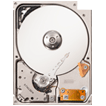Software tools support consumer device hard drives
Jan 11, 2007 — by LinuxDevices Staff — from the LinuxDevices Archive — 1 views Seagate has released a suite of drivers and utilities aimed at improving the performance of hard drives in consumer devices. The Storage Management Module (SMM) supports several embedded chipsets and OSes — including Linux — and aims to improve battery life, ruggedness, start-up time, and recording/playback.
Seagate has released a suite of drivers and utilities aimed at improving the performance of hard drives in consumer devices. The Storage Management Module (SMM) supports several embedded chipsets and OSes — including Linux — and aims to improve battery life, ruggedness, start-up time, and recording/playback.
According to Seagate, the amount of content stored on consumer devices is “increasing exponentially,” yet native support for hard drives does not necessarily exist on the chipsets that power these devices. The company says it is currently collaborating with leading chipset manufacturers, including STMicroelectronics, Marvell, and others, to remedy this situation.
The SMM Express Integration Kit comprises a suite of tools that address specific areas of HDD integration and optimization, according to Seagate. Functionality is said to include:
- SeaFAT file system — a simple file system for RTOS and proprietary operating systems
- Power Manager — reduces the amount of time the drive spends in “active” mode, providing upwards of 85 percent power savings in some operational states such as idle
- Integrated Flash Manager — works with the solid-state memory in consumer electronic devices to deliver features such as instant-on and faster playback and recording response
Seagate says the initial version of the SMM Express Integration Kit will utilize a CE-ATA driver set for mobile electronics, and will be work with the SD and MMC controllers currently found in most mobile consumer devices.
SMM also supports Seagate's “free fall protection” technology. This functionality in Seagate's mobile consumer hard drives works in tandem with free fall sensors in portable and handheld devices. When the device detects that it is in a free fall condition, it issues commands to the hard drive that tell it to take steps to protect itself, such as powering down its motor and parking its read-write heads away from the disk's surface.
According to Seagate VP of Product Development David Mosley, SMM will result in “hard drive-based products that offer longer battery life, instantaneous power-on, and better recording and playback performance.”
This article was originally published on LinuxDevices.com and has been donated to the open source community by QuinStreet Inc. Please visit LinuxToday.com for up-to-date news and articles about Linux and open source.